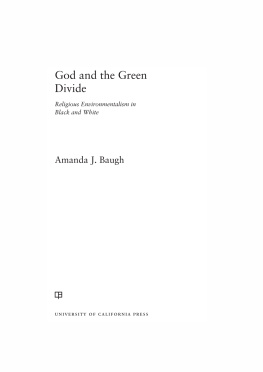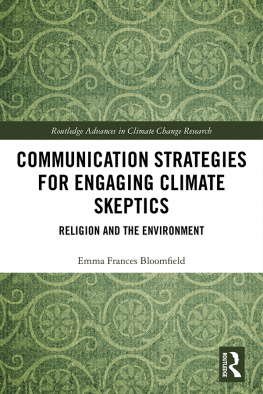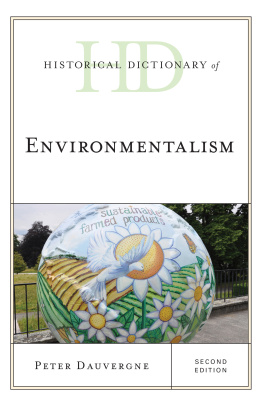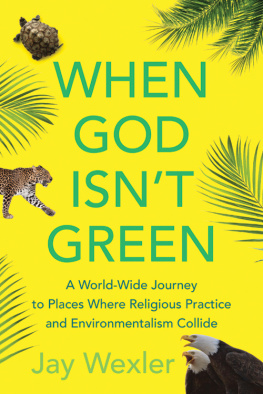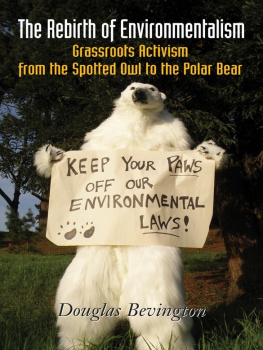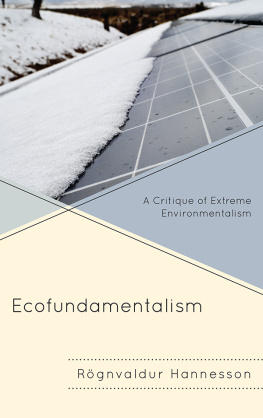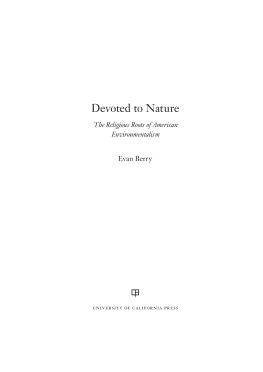EBSCOhost - printed on 12/9/2022 7:32 AM via . All use subject to https://www.ebsco.com/terms-of-use
Acknowledgments
This book would not have been possible without the generous support of many people. First and foremost, I would like to thank the tireless leaders of Faith in Place, especially Clare Butterfield and Veronica Kyle, without whom this project could never have materialized. In addition to instigating the religious environmental activism that provided material to study, they kindly gave their time and support, candidly sharing some of their innermost beliefs and aspirations. These women made me feel comfortable in their worlds, inviting me to visit places I could never have found on my own (and often transporting me to those places!), and generally made my research experience a pleasure. I am also grateful to the other staff members, board members, volunteers, and participants at Faith in Place who were generous with their time and enthusiastically contributed to my research.
My professors and colleagues at Northwestern University guided this project from its earliest stages. Sarah McFarland Taylor encouraged my research from the beginning, training me in the art of fieldwork and reminding me of the bigger implications of my research and teaching. Robert Orsi challenged me to push my theoretical analysis, pursuing the difficult, sometimes uncomfortable questions. Sylvester Johnson helped me navigate the complicated terrain of racial politics that was evident throughout my fieldwork. Cristina Traina, Henry Binford, and Michelle Molina provided insights and encouragement. Northwestern Universitys Graduate School funded essential travel through a Research Travel Grant. This project also received generous funding from the Andrew W. Mellon/American Council of Learned Society Dissertation Completion Fellowship Program.
Members of Northwesterns North American Religions Workshop contributed compelling ideas and questions that have shaped this project. I especially want to thank Brian Clites, Matthew Cressler, and Hayley Glaholt. Abdoulaye Sounaye, Anne Koenig, and Abby Trollinger offered critical feedback, guidance, and motivation in the dissertation-writing phase. Michal Raucher and Tina Howe provided unparalleled insight and support throughout our days at Northwestern and as the project developed into a book. These brilliant women also made graduate school a pleasure. I value their lifelong friendships.
My colleagues at California State University, Northridge have also provided encouragement and intellectual engagement. I especially want to acknowledge Rick Talbott, Claire White, Xochitl Alviso, and Linda Lam-Easton. Lindsay Gonzaba provided excellent assistance in compiling the index. I am grateful for a wonderfully supportive dean, Elizabeth Say, who provided writing space, coffee, and the best gift of all, time to pursue my writing. I would not have been able to complete this project without the generous funding from several CSUN sources, including the College of Humanities, the Office of Research and Sponsored Projects, and Faculty Development.
Im deeply indebted to Sarah Pike for her brilliant guidance as I revised my dissertation into this book. Sarah challenged me to employ precision and nuance, make difficult decisions about content, and pursue areas of inquiry that I had not previously considered. At the University of California Press, Eric Schmidt offered direction and encouragement as the project went through various stages of development. Thanks also to Maeve Cornell-Taylor for her assistance in preparing the book for production.
On a personal level, I wish to acknowledge the wonderful support of my family. Josh Baugh and Ashley Cash have provided encouragement, friendship, and editorial assistance. They also produced two amazing and delightful nieces, Emma and Katelyn Baugh. My parents, George Baugh and Alissa Levey Baugh, have been my most enthusiastic supporters, always ensuring that I had the material resources to achieve my goals and pushing me to make my mark in the world. Without my mothers insistence that I take Introduction to Judaism as an undergraduate, I might never have found my way to religious studies. My father has been a unique conversation partner as I explore the inner workings of religious worlds. He has encouraged me to find a vocation that is meaningful and rewarding, working hard but also injecting my work with humor and play.
More than anyone else, Jason Lee has lived with the trials, tribulations, and joys that accompany the academic life. He has been a wonderful sounding board as I have tried to develop ideas, has accompanied me on several fieldwork excursions and conference trips, and has offered an impressive editorial eye. He and our son, Zachary Lee, are sources of boundless joy and provide perspective on the important things in life. Together they make me feel like I have it all.
EBSCOhost - printed on 12/9/2022 7:32 AM via . All use subject to https://www.ebsco.com/terms-of-use

